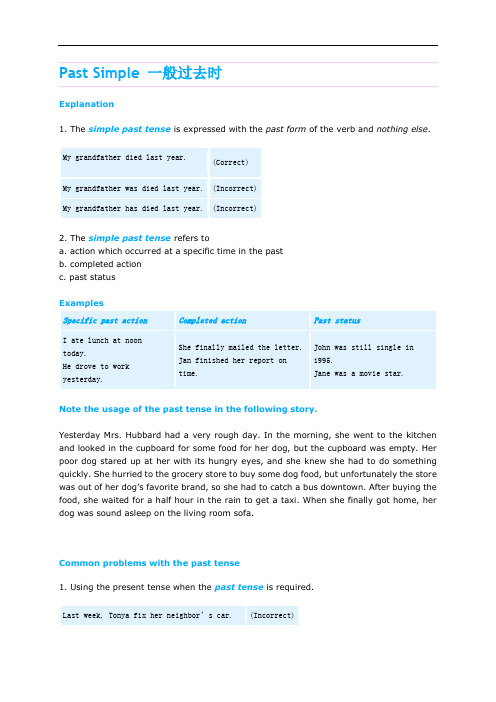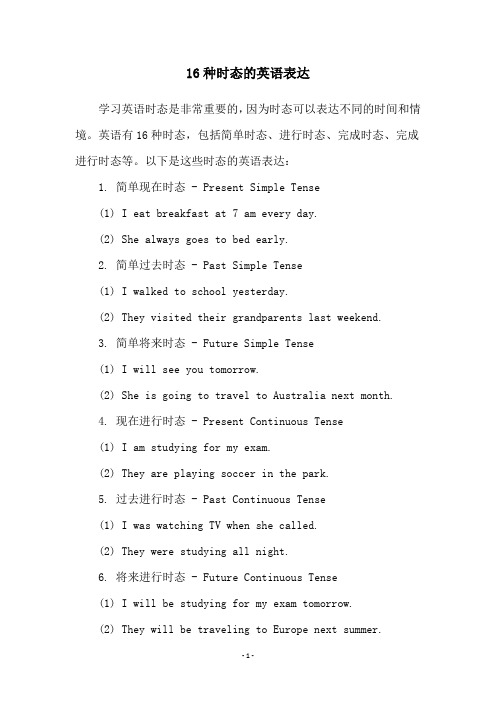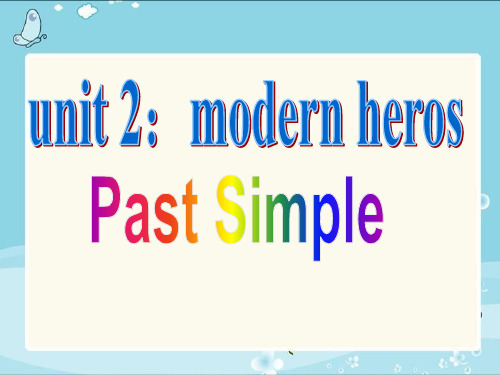past simple & past continuous
小学英语-PRESENT-PERFECT-vs-PAST-SIMPLE

Hello! Have you packed your things
yet?
Yes, yes… don’t worry Tintin. We have
already packed our things up!!
We also use the PRESENT PERFECT with the following EXPRESSIONS:
We use the PRESENT PERFECT with the following TIME ADVERBS:
JUST
Look!! The car has just broken
down!!
• Just indicates a very short time before now. • The event or action has just finished.
TIME EXPRESSIONS that indicate an
unfinished time period.
Early this morning
Still this morning
Where is Snowy?... I have heard enough bad news this morning!... Snowy!... Snowy!... Oh, he has gone out …
• It is used in questions. • POSITION: Have / has + subject + EVER + past
participle.
NEVER
• It is used in affirmative sentences. • POSITION: Have / has + NEVER + past participle.
英语基础教学 Past Simple (NEGATIVE form)

2. She _____________ (not listen) to the radio 3. I _________________ (not be) tired 4. Mark ______________ (not work) last
Monday 5. They _______________ (not swim)
yesterday
Write the following sentences in the negative form
•Susan went to the park yesterday ________________________________________ •We studied English last night. ________________________________________ •You were my friend. ________________________________________ •They broke the window ________________________________________ •I did my homework ________________________________________ •He was tired yesterday ________________________________________
past simple用法(一)

past simple用法(一)过去式(Past Simple)的用法过去式(Past Simple)是英语中表示过去发生的动作或情况的基本时态。
在文章中,可以通过以下方式详细讲解过去式的用法:1. 表示过去发生的动作•常规动词的过去式构成一般为动词原型加上-ed,例如:played (玩),finished(完成)。
•一些动词过去式形式不规则,例如:went(去),broke(打破),需要单独记忆。
2. 表示过去的状态或情况•过去式也可以用来表示过去的状态或情况,例如:He was tired (他很累)。
•在这种情况下,be 动词的过去式是 was/were。
3. 表示过去的习惯或经常性动作•过去式也可以用来表示过去的习惯或经常性动作,例如:She often walked to school(她经常步行上学)。
•这种用法通常与表示频率的词语或时间状语连用,如:often (经常)、always(总是)、every day(每天)等。
4. 表示过去的时间点或时间段•过去式可以用来表示过去发生的某个具体时间点或一段时间,例如:I saw him yesterday(我昨天见到了他)。
•这种用法通常与表示过去时间的副词或短语连用,如:yesterday(昨天)、last week(上周)等。
5. 表示过去的条件和假设•过去式还可以用来表示过去的条件和假设,例如:If I won the lottery, I would buy a mansion(如果我中了彩票,我会买一栋豪宅)。
•在这种情况下,过去式常与虚拟语气连用,表示与当前事实不符合的情况。
6. 表示过去的间接引语•过去式也用于引述或复述别人在过去所说的话,例如:He said he was busy(他说他很忙)。
•在这种情况下,引用的动词通常改为过去式。
总的来说,过去式在英语中的用法非常广泛。
无论是表示过去发生的动作、描述过去的状态、表达过去的习惯、指明过去的时间点或时间段,还是表达过去的条件和假设,过去式都扮演着重要的角色。
3.英语时态学习:Past Simple 一般过去时

My grandfather has died last year.
(Incorrect)
2. Thesimple past tenserefers to
a. action which d at a specific time in the past
b. completed action
c. past status
Examples
Specific past action
Completed action
Past status
I ate lunch at noon today.
He drove to work yesterday.
She finally mailed the letter.
Common problems with the past tense
1. Using the present tense when thepast tenseis required.
Last week, Tonya fix her neighbor’s car.
(Incorrect)
Last week, Tonya fixed her neighbor’s car.
Past Simple一般过去时
Explanation
1. Thesimple past tenseis expressed with thepast formof the verb andnothing else.
My grandfather died last year.
(Correct)
My grandfather was died last year.
Jan finished her report on time.
16种时态的英语表达

16种时态的英语表达学习英语时态是非常重要的,因为时态可以表达不同的时间和情境。
英语有16种时态,包括简单时态、进行时态、完成时态、完成进行时态等。
以下是这些时态的英语表达:1. 简单现在时态 - Present Simple Tense(1) I eat breakfast at 7 am every day.(2) She always goes to bed early.2. 简单过去时态 - Past Simple Tense(1) I walked to school yesterday.(2) They visited their grandparents last weekend.3. 简单将来时态 - Future Simple Tense(1) I will see you tomorrow.(2) She is going to travel to Australia next month.4. 现在进行时态 - Present Continuous Tense(1) I am studying for my exam.(2) They are playing soccer in the park.5. 过去进行时态 - Past Continuous Tense(1) I was watching TV when she called.(2) They were studying all night.6. 将来进行时态 - Future Continuous Tense(1) I will be studying for my exam tomorrow.(2) They will be traveling to Europe next summer.7. 现在完成时态 - Present Perfect Tense(1) I have eaten breakfast already.(2) She has seen that movie twice.8. 过去完成时态 - Past Perfect Tense(1) I had finished my homework before dinner.(2) They had already left when we arrived.9. 将来完成时态 - Future Perfect Tense(1) I will have finished my project by next week.(2) She will have studied English for five years by next month.10. 现在完成进行时态 - Present Perfect Continuous Tense(1) I have been studying for two hours.(2) They have been playing video games all day.11. 过去完成进行时态 - Past Perfect Continuous Tense(1) I had been waiting for an hour before she arrived.(2) They had been studying for the final exam for weeks.12. 将来完成进行时态 - Future Perfect Continuous Tense (1) I will have been studying for six hours by the time the exam starts.(2) They will have been working on the project for a week by Friday.13. 现在完成完成时态 - Present Perfect Perfect Tense(1) I have had breakfast.(2) She has had a lot of experiences in her life.14. 过去完成完成时态 - Past Perfect Perfect Tense(1) I had had enough sleep before I went to work.(2) They had had a great time on their vacation.15. 将来完成完成时态 - Future Perfect Perfect Tense(1) I will have had enough practice by the time of the competition.(2) They will have had a successful year by the end of December.16. 直接引语 - Direct Speech(1) He said, 'I am happy to see you.'(2) She said, 'I will call you later.'以上是16种时态的英语表达,了解并掌握这些时态的用法对英语学习非常有益。
Past Simple 英语一般过去时

行为动词的一般过去时句式:
1).肯定句:主语+动词过去式+其他。 ❖ They played basketball last Sunday. 2).否定句: 主语+did+ not+动词原形+其他 ❖ They didn’t play basketball last Sunday 3).一般疑问句:Did+主语+动词原形+其他?
Look at these two pictures:
Past
past
(attend the school ) six weeks ago
now
now
(be in the school) now
• PAST SIMPLE:describe sth. happened in the past or past situations.
8. Betty __w__o_r_k_e_d___ (work) hard all last year.
9. Last year Frances __b_o_u_g__h_t_ (buy) her mother a pretty watch for
her birthday.
Make sentences: I went for a walk last weekend.
am/is ---was are---were
wasn’t=was not weren’t=were not
Tom was a student three years ago.
否定句: 一般疑问句: 肯定回答: 否定回答:
Tom wasn't a student three years ago. Was Tom a student three years ago? Yes, he was. No, he wasn’t.
英文中关于时间的表达
英文中关于时间的表达In English:1. Present Time.Present simple: Describes habitual actions or general truths.Examples: I go to school every day. The sun rises in the east.Present continuous (progressive): Indicates actions happening now or over a period of time.Examples: I'm watching TV. They are studying for the exam.Present perfect: Emphasizes the connection between a past event and the present.Examples: I have studied English for five years. She has just finished her work.Present perfect continuous: Focuses on the duration or ongoing nature of an action.Examples: I have been working on this project for two hours. They have been arguing for days.2. Past Time.Past simple: Refers to completed actions in the past.Examples: I went to the park yesterday. They played football last week.Past continuous (progressive): Describes actions taking place at a specific time in the past.Examples: I was sleeping when the phone rang. They were eating dinner at 8 pm.Past perfect: Indicates an action that occurred before another action in the past.Examples: I had finished my work before you arrived. She had lost her keys before she left the house.Past perfect continuous: Emphasizes the duration of an action prior to a point in the past.Examples: I had been waiting for the bus for an hour. They had been living in London for five years.3. Future Time.Future simple: Expresses actions that will happen at a specific time or in the future.Examples: I will meet you tomorrow. They will finish the project next month.Future continuous (progressive): Indicates actionsthat will be in progress at a specific time in the future.Examples: I will be studying at the library tonight. They will be traveling to Paris next summer.Future perfect: Conveys the idea that an action will be completed before another action in the future.Examples: I will have graduated by next year. She will have retired before she turns 60.Future perfect continuous: Highlights the duration of an action that will have been ongoing before a point in the future.Examples: I will have been working for this company for five years by next June. They will have been living in the same house for over a decade.4. Conditional Sentences.Zero conditional: Describes general truths or universal facts.Examples: If it rains, the ground gets wet. When you press the button, the light turns on.First conditional: Expresses a possible or probable event based on a condition.Examples: If I study hard, I will pass the exam.If you take a taxi, you will be there on time.Second conditional: Indicates a hypothetical or unlikely situation.Examples: If I were a millionaire, I would travel around the world. If it rained, the game would be canceled.Third conditional: Refers to events that did not happen in the past due to a different situation.Examples: If I had studied harder, I would have passed the test. If they had arrived on time, they would not have missed the flight.5. Relative Clauses.Defining relative clauses: Restrict or define the noun they modify.Examples: The book that I'm reading is very interesting. The man who lives next door is a doctor.Non-defining relative clauses: Provide additional information without defining the noun.Examples: The book, which I bought yesterday, is very interesting. The man, who is my neighbor, is a doctor.Relative adverbs: Connect a relative clause to a main clause and serve specific functions.Examples: Where I live is beautiful. The reason why I'm here is to help you.In Chinese:1. 现在时。
PastSimplevsPastPerfect一般过去时和过去完成时专家讲座
PastSimplevsPastPerfect一般过去时和过去完成时专家讲座
第17页
• Exercises: • 翻译句子: • 1. 到上个月底,你看了多少部英文电影?
第2页
1. ran out of breath 2. drank water
——————∣—————∣—————→∣——→
had run out
drank water
now
of breath
He had run out of breath before he drank water.
After he had run out of breath, he drank water.
PastSimplevsPastPerfect一般过去时和过去完成时专家讲座
第10页
(2) 状语从句中: 在时间、条件、原因、方式等 状语从句中,主、从句动作发生有先后关系,动 作在前,要用过去完成时,动作在后要用普通过 去时。如:
当我抵达车站时,火车已经离开了。When I got to the station, the train had already left.
___________ (buy) the tickets already. Simon and Daniel came next. Before Scimamone and Daniel _______ (comhaed), gMoilnliee and I ___________ (go) to get some
过去简单时态(Past Simple)
过去简单时态(Past Simple)用法过去简单时态通常用于以下情况:1. 表示过去的经历或事件,包括动作、行为、惯等,如:I watched a movie last night.(我昨晚看了一部电影。
)2. 描述过去的情况或状态,如:She lived in Paris for five years.(她在巴黎住了五年。
)3. 表示过去的真理、事实或普遍性观念,如:Newton discovered gravity.(牛顿发现了重力。
)形式过去简单时态由动词的过去式构成,加上主语的相应形式。
其构成形式如下:1. 对于大多数动词,过去式可通过在动词原形后添加-ed或-d来形成,如:walked(走),talked(说话),played(玩),loved (爱)等。
2. 对于以-e结尾的动词,只需添加-d即可,如:lived(住)。
3. 对于以辅音字母+y结尾的动词,将y变为i,再添加-ed,如:studied(研究),carried(携带)。
4. 另外,一些常见的不规则动词,在过去式时需根据变化规则进行形式改变,如:go(went),eat(ate),have(had),see (saw)等。
需要注意的是,过去简单时态中,be动词的过去式有两种形式:was和were,具体使用取决于主语的单复数。
例如:I was in the office yesterday.(我昨天在办公室。
)They were at home last night.(他们昨晚在家。
)以上是关于过去简单时态的介绍。
熟练掌握过去简单时态的用法和形式,将有助于提高英语口语和写作的能力。
Present Perfect &Past Simple
Past Simple:
Past Simple to talk about finished
actions or past situations and habits.
He always phoned on Friday. She climbed the stairs and went to her
1. Have you ever thought about becoming an architect? 2. We’ve never heard the story of Rip Van Winkle before.
3. Have you heard from your family recently? 4. Peter has written two novels so far. 5. There has been too much rain in San Francisco this year. 6. The friendly relations and cooperation between our two countries have been enhanced in the past few years. 7. Up to the present everything has been successful.
1. Learn the words in Communication Workshop by heart 2. Search the Internet for something about the sports stars on P30 .We’ll have a discussion in class. 3. Read the story and figure out the stages of writing a story
- 1、下载文档前请自行甄别文档内容的完整性,平台不提供额外的编辑、内容补充、找答案等附加服务。
- 2、"仅部分预览"的文档,不可在线预览部分如存在完整性等问题,可反馈申请退款(可完整预览的文档不适用该条件!)。
- 3、如文档侵犯您的权益,请联系客服反馈,我们会尽快为您处理(人工客服工作时间:9:00-18:30)。
vowels元音组: 单元音(monophthong):12个 /i:/ /ɪ/ /e/ /æ / (前元音) /ɜ:/ /ə/ (中元音) /ɑ:/ /ʌ/ /ɔ:/ /ɒ / /u:/ /ʊ/ (后元音)
Past continuous:过去进行时 公式:主语+be (was/were)+动词的现在分词 用法:1、表示过去某一时间正在进行的动作 e.g. I was reading “Oliver Twist” at 9 o’clock. 2、表示在过去某一段时间内进行的动作 e.g. I was writing a story last night. 3、表示说话人的感情或情绪,多与always等副 词连用 e.g. She was always saying that.
主将从现 在if引导的条件状语从句中,主句用一般将 来时,从句用一般现在时。 e.g. If you offer a hand to me, I will finish it soon. We won’t go shopping, if it rains this afternoon.
What we’ve learned for this week?
objectives
1)know the use of past simple, past continuous and future 2) use past simple, past continuous and future correctly
Simple past:一般过去时 公式:主语+动词的过去式(-ed) 主语+be (was/were) 动词变过去式规则 1) 规则动词的过去式、过去分词都是在原形 后面加ed,以e结尾的动词后直接加d 2) 以一个辅音字母结尾的重读闭音节词,双 写辅音字母再加ed 3) 以辅音字母加y结尾的动词,变y为i加ed *记动词不规则变化表 P113
半元音 / j/ / w/
Homework
1) Write the new words from Lesson 4 to Communication Workshop, 3 for each 2) Irregular verbs 3) Textbook: P54-1, 2, 3
Future:一般将来时 表示将来时间要发生的动作 e.g. It will be fine tomorrow. 表示将来时的方式有: 1、will do/ shall do (第一人称用shall,二、三人称用will) 2、be going to do 3、be to do 现在进行时表将来 (安排、计划好的事) e.g. I am meeting Tom at the airport tomorrow morning.
双元音(diphthong):8个 /aɪ/ /eɪ/ /aʊ/ /əʊ/ /ɪə/ /eə/ /ʊə/ /ɔɪ/
辅 音 (28个) 清辅音 /p/ / t/ 浊辅音 /b/ /d/ / k/ /g/ /f/ /v/ /θ/ /ð/ /s/ /z/
清辅音 /ʃ/ / h/ /ts/ /tʃ/ /tr/ 浊辅音 /ʒ/ / r/ /dz/ /dʒ/ /dr/ 鼻音 /m/ /n/ /ŋ/ 边音 / ǀ/
4、表示过去按计划安排好的将要发生的动 作,常用于come, go, leave, stay等词。 e.g. She said she was leaving for Beijing the next day. He told me he was staying in the city for a week. 5、表示在过去一段时间内反复进行的动作 e.g. For varieties of reasons, Jim was often moving. 6、表示故事发生的背景 e.g. One morning, the lonely boy was lying in bed when he heard some lovely music.
努力的工作使人进步。 Hard work leads to progress.
Today’s sentence It is important to live a healthy lifestyle to reduce pressure . 以健康的生活方式来降低压力是很重要的。
Grammar
Past simple:一般过去时 Past continuous:过去进行时
